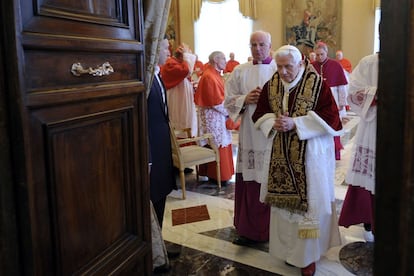The cry of a Pope who never raised his voice
Benedict XVI tried and failed to remove pedophile clerics and corrupt moneymen from the Vatican

Joseph Ratzinger was a gentle man. He was quite unlike either his impetuous predecessor, Karol Wojtyla, or his change-making successor, Jorge Mario Bergoglio. So, when, on February 11, 2013, he announced in Latin that he was resigning from the papacy, there was a collective gasp from the cardinals accompanying him during a canonization ceremony at the Holy See. One cardinal, Angelo Sodano, declared: “Your Holiness, beloved and venerated successor of Peter, your message has fallen among us like a bolt of lightning from a serene sky.” The phrase may have sounded appropriate, but it was a far cry from reality.
For there was little in the way of love, veneration or serenity surrounding the former Pope. If Benedict XVI had lacked anything in his final years as the head of the Catholic Church, it was the affection of the Roman Curia, which was involved in obscene struggles over power and money, to the point that two of the people in whom he had placed his trust ended up embroiled in that poisoned web. A year prior to his resignation, his personal secretary, Paolo Gabriele, his faithful Paoletto, had stolen his secret correspondence, which he then leaked to the media. And the banker Ettore Gotti Tedeschi – in whom Ratzinger had entrusted the difficult and dangerous task of shedding light on the Church’s accounts – was so brutally discredited and harassed that, when the Carabinieri showed up at his house to carry out a search, he breathed a sigh of relief and said to the head of the operation: “Ah, it’s you. I thought they were coming to shoot me.”
As theatrical as it may seem now, this was ultimately how things stood in Benedict XVI’s pontificate. The leaking of secret documents, in which allegations of corruption and a bizarre plot to assassinate the Pope emerged, were only symptoms of the deep ills that afflicted the Vatican, and which Ratzinger, old, sick and alone, tried to deal with. His efforts to cleanse the Church of pedophile clerics – he was the first Pope to publicly say enough was enough – and of corrupt bankers – Gotti Tedeschi wrote down his suspicion that some of the encrypted accounts opened in the Holy See’s bank hid illicit funds from businessmen, politicians and Mafia bosses – made him dangerous. And the witch-hunt began. First to fall were those pawns closest to him. The harassment escalated to the point that L’Osservatore Romano, the Vatican City newspaper, wrote in early 2012 that Joseph Ratzinger, then 85, was “a shepherd surrounded by wolves.”
On the staircase of the headquarters of the Stampa Estera, the historic association that houses the foreign press in Rome, there is a photograph. It shows John Paul II with his face bloated, sick and close to death, as he carries the cross during one of his last Stations of the Cross in the Colosseum at Easter. Next to him is Cardinal Joseph Ratzinger, then Prefect of the Congregation for the Doctrine of the Faith. Already at that time, Ratzinger had tried without success to remove people like Marcial Maciel, the founder of the Legionaries of Christ, a thief and pederast who fathered three children, a monster who initially took advantage of Wojtyla’s friendship, and latterly his weakness. That photo could be the origin of Ratzinger’s resignation. Having witnessed it firsthand, he knew the damage that could be done by a weak pope to a Church afflicted by so many ills – a pope incapable of doing battle against such powerful enemies. His resignation was nothing more than the cry of a man who never raised his voice.
Sign up for our weekly newsletter to get more English-language news coverage from EL PAÍS USA Edition
Tu suscripción se está usando en otro dispositivo
¿Quieres añadir otro usuario a tu suscripción?
Si continúas leyendo en este dispositivo, no se podrá leer en el otro.
FlechaTu suscripción se está usando en otro dispositivo y solo puedes acceder a EL PAÍS desde un dispositivo a la vez.
Si quieres compartir tu cuenta, cambia tu suscripción a la modalidad Premium, así podrás añadir otro usuario. Cada uno accederá con su propia cuenta de email, lo que os permitirá personalizar vuestra experiencia en EL PAÍS.
¿Tienes una suscripción de empresa? Accede aquí para contratar más cuentas.
En el caso de no saber quién está usando tu cuenta, te recomendamos cambiar tu contraseña aquí.
Si decides continuar compartiendo tu cuenta, este mensaje se mostrará en tu dispositivo y en el de la otra persona que está usando tu cuenta de forma indefinida, afectando a tu experiencia de lectura. Puedes consultar aquí los términos y condiciones de la suscripción digital.









































